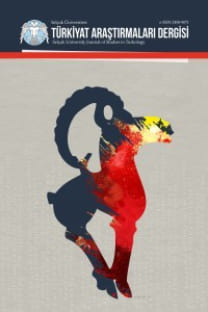BİLGE KARASU’NUN GECE VE KILAVUZ ADLI ROMANLARINDA POSTMODERN ÖZNE VE ANLATI
Postmodernizm, klasik ve modern düşünme biçimlerinin bütüncül ve sistematik yapısına, normatif kalıplarına karşı ortaya çıkan modernite sonrası bir fenomendir. Hem kültürel hem de düşünsel anlamda geleneksel ayrımlara, kendi içerisinde hiyerarşi oluşturan kavramsal ön kabul ve yargılara karşıdır. İndirgeyici ve tek-merkezli sınıfsal kümelenmeleri ayrıştırır; bunun yerine çok sesli, marjinal bir toplum imgesi yaratır. Edebî anlamda postmodernizm kendi içine kapanmış, çağrışımdan yoksun nihai anlam dizilerini, kurgusal kalıpları kırmaya çalışır. Yazarın tanrı benzeri kurgusal hâkimiyetini, anlatı öznelerinin iki boyutlu yapısını, kalıplaşmış anlatı statükosunu yok eder. Konvansiyonel ikililikleri; kurmaca ile hakikati, sıra dışı ile sıradanı, sahte ile gerçeği, esas ile marjini birbirleriyle çarpıştırır. Batı edebiyatında postmodernist anlatı, modernizme karşı geliştirilen belirli estetik yeniliklerin ve süreçlerin sonucunda ortaya çıkar. Fakat Türk edebiyatında roman sanatı türsel olgunluğuna daha geç dönemde ulaşır. Bu nedenle modernist ve postmodernist estetik nitelikler, kimi eserlerde bir arada bulunur. Postmodernist roman, kendi özgün ve radikal formuna Türk edebiyatında seksenli ve doksanlı yıllarda ulaşır. Bilge Karasu, bu bağlamda postmodernist biçime ve bu biçiminin dinamik özelliklerine eserlerinde yer veren önemli isimlerdendir. Onun Gece ve Kılavuz adlı romanları, postmodern anlatı yapısını ve özne kurgularını içerisinde taşıyan özgün eserlerdendir. Bu çalışmanın amacını, Gece’de ve Kılavuz’da yer alan özne kurgularının, postmodern edebiyatın nitelikleri dikkate alınarak incelenmesi oluşturmaktadır.
Anahtar Kelimeler:
Bilge Karasu, Gece, Kılavuz, Türk Romanı, Postmodernizm, Merkezsizleşme, Permütasyon, Bilge Karasu, Gece, Kılavuz, Türk Romanı, Postmodernizm, Merkezsizleşme, Permütasyon
POSTMODERN SUBJECT AND NARRATIVE IN BILGE KARASU'S NOVELS GECE AND KILAVUZ
Postmodernism is a phenomenon that arises against the holistic and systematic structure, normative patterns of classical and modern ways of thinking. It opposes traditional distinctions in both cultural and intellectual terms, conceptual presuppositions and judgments that form a hierarchy within themselves. Postmodernism parses reductive and single-centered class clusters, instead creating a polyphonic, marginal image of society. In the literary sense postmodernism tries to break precise sequences of meaning, fictional patterns that lack connotation. It destroys the god-like fictional dominance of the author, the two-dimensional structure of narrative subjects, the stereotyped narrative status quo. In postmodernism conventional dualities, fiction, and truth, extraordinary and ordinary, fake and truth, basis and margin collide with each other. Postmodernist writing in Western literature is the result of certain aesthetic innovations and processes developed against Modernism. However, in Turkish literature, art of novel reaches its artistic maturity at a later period. For this reason, modernist and postmodernist innovative aesthetic qualities appear together in some works. In Turkish literature, the postmodernist novel reaches its original and radical form in the 1980s and 1990s. Bilge Karasu, in this context, is one of the most important names in Turkish literature that includes the form of postmodernist writing and the dynamic characteristics of postmodern literature. His novels, Gece and the Kılavuz, are distinctive works that contain the postmodern narrative structure and subjects. The aim of this study is to examine the construction of postmodern subjectivity in Gece and Kılavuz, taking into account the qualities of postmodern writing.
Keywords:
Bilge Karasu, Gece, Kılavuz, Turkish Novel, Postmodernism, Decentralization, Permutation, Bilge Karasu, Gece, Kılavuz, Turkish Novel, Postmodernism, Decentralization, Permutation,
___
- Booth, W.C. (2012). Kurmacanın retoriği. İstanbul: Metis Yayınları.
- Connor, S. (ed.). (2004). The cambridge companion to postmodernism. Cambridge: Cambridge University Press.
- Doltaş, D. (2003). Postmodernizm ve eleştirisi. İstanbul: İnkılâp Yayınevi.
- Eagleton, T. (2011). Postmodernizmin yanılsamaları. İstanbul: Ayrıntı Yayınları.
- Ecevit, Y. (2011). Türk romanında postmodernist açılımlar. İstanbul: İletişim Yayınları.
- Eliuz, Ü. (2016). Oyunda oyun postmodern roman. İstanbul: Kesit Yayınları.
- Emre, İ. (2004). Postmodernizm ve edebiyat. Ankara: Anı Yayıncılık.
- Fokkema, D.W., Bertens, H. (eds.). (1986). Approaching postmodernism. Amsterdam, Philadelphia: John Benjamins Publishing Company.
- Genette, G. (2020). Anlatının söylemi. İstanbul: Ayrıntı Yayınları.
- Harper, B. H. (1994). Framing the margins: The social logic of postmodern culture. N.Y, Oxford: Oxford University Press.
- Hassan, I. (1986). Pluralism in Postmodern Perspective. Critical Inquiry, 12(3), pp.503-520.
- Hassan, I. (2019). Orpheus’un parçalanışı, Ankara: Hece Yayınları.
- Hutcheon, L. (2020). Postmodernizmin poetikası. Ankara: Hece Yayınları.
- Jameson, F. (2008). Postmodernizm ya da geç kapitalizmin kültürel mantığı. Ankara: Nirengi Kitap.
- Karasu, B. (2016). Gece. İstanbul: Metis Yayınları.
- Karasu, B. (2019). Kılavuz. İstanbul: Metis Yayınları.
- Küçük, M. (2000). Modernite versus postmodernite. Ankara: Vadi Yayınları.
- Lucy, N. (2003. Postmodern edebiyat kuramı. İstanbul: Ayrıntı Yayınları.
- McHale, B. (2004) Postmodern fiction. London and New York: Routledge, Taylor & Francis e-Library.
- Moran, B. (2016). Türk romanına eleştirel bir bakış 3. İstanbul: İletişim Yayınları.
- Waugh, P. (2001). Metafiction: The theory and practice of self-conscious fiction, Londra, New York: Routledge, Taylor & Francis e-Library.
- Zamora, L. P.-Farris, W. B. (2003). Magical realism theory, history, community. Durham: Duke University Press.
- ISSN: 1300-5766
- Yayın Aralığı: Yılda 3 Sayı
- Başlangıç: 1994
- Yayıncı: Selçuk Üniversitesi
Sayıdaki Diğer Makaleler
SOYVET DÖNEMİ AZERBAYCAN TİYATROSU ÜZERİNE BİR İNCELEME
ÜSKÜDAR VE KAYSERİ’DE İŞLENEN GAYR-I AHLAKİ SUÇLAR
NÜZUL EMİNİ EL-HÂC AHMED AĞA’NIN SERVETİ ÖRNEĞİNDE 18. YÜZYIL İSTANBUL’UNDA ZENGİN OLMAK
TÜRKÇE-RUMCA MANZUM SÖZLÜKLER DİZİSİ II: TUHFE-İ RUMÎ
AKKİRMÂNÎ MUHAMMED B. MUSTAFA’NIN MENSUR HZ. MUHAMMED HİLYESİ
GÖK İLE YER ARASINDA ‘İNSANÎ NEFS’İ KONUŞMAK: ÂŞIK PAŞA’NIN GARİBNÂME’SİNDE ‘İNSANÎ NEFS’İN HÂLLERİ
